Notes
This article needs additional citations for verification .(August 2010) |
- ↑ Chisholm 1911, p. 932.
Thomas White (died 1580) was an English state official who came to prominence during the Dudley conspiracy of 1555 against Mary I of England. [lower-alpha 1]
He was the son of John White. He lived in Tuxford in Nottinghamshire. Thomas married Agnes (aka Anne) Cecil, the daughter of Richard Cecil. Agnes' brother was Queen Elizabeth I's great Lord Treasurer, Sir William Cecil, 1st Lord Burghley).
During the plot, Sir Henry Dudley, a kinsman of the Duke of Northumberland, tried to place Princess Elizabeth on the throne of England, disposing of Mary. Thomas White was an official in the Exchequer. His part in the plot was to have been a minor one whereby he was to have arrange the robbery of the Exchequer to provide finance for the plotters to pay for the army of exiles and mercenaries they were attempting to bring over from the Continent. White became frightened as time went on, and confessed to Cardinal Pole all he knew. The plot was foiled. As a reward for his loyalty, White was rewarded by the gracious gift of four estates from the Queen. The estates were: Cotgrave, Notts., and Preston, Stone, and Kynwadeston, in Somerset. "In consideration," so runs the Originalia Roll, 3 and 4 Phil, and Mary, "of good and faithful service by our beloved servant, Thomas White, gentleman, in that late conspiracy against us, our crown and dignity attempted not long since by Henry Dudley and his accomplices." Thomas’s wife is called Agnes Cecil throughout this grant.
In addition to these manors and his Collingham property, Thomas possessed the manor of Ruddingston, Notts.; lands at Holbich, Lincoln; Stilton, Hunts.; and the estate of Woodhead, in Rutland. In 1560, he purchased the greater part of the remaining portion of the manors of Tuxford, and his son, Sir John White, completed the acquisition of the whole. Thomas White died on 26 October 1580, and is buried with his wife (who survived him) in the smaller of the two vaults of the White’s mortuary chapel on the north side of the Church of St. Nicholas, Tuxford.
This article needs additional citations for verification .(August 2010) |
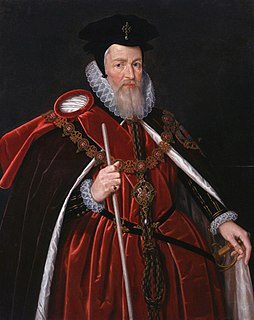
William Cecil, 1st Baron Burghley was an English statesman, the chief adviser of Queen Elizabeth I for most of her reign, twice Secretary of State and Lord High Treasurer from 1572. In his description in the Encyclopædia Britannica Eleventh Edition, Albert Pollard wrote, "From 1558 for forty years the biography of Cecil is almost indistinguishable from that of Elizabeth and from the history of England."

Elizabeth is a 1998 British biographical period drama film directed by Shekhar Kapur and written by Michael Hirst. It stars Cate Blanchett in the title role of Elizabeth I of England, with Geoffrey Rush, Christopher Eccleston, Joseph Fiennes, John Gielgud, and Richard Attenborough in supporting roles. The film is based on the early years of Elizabeth's reign, where she is elevated to the throne after the death of her half-sister Mary I, who had imprisoned her. As she establishes herself on the throne, she faces plots and threats to take her down.
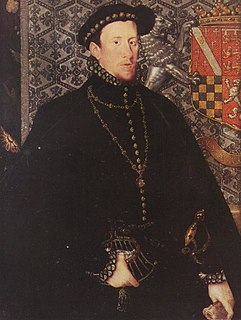
Thomas Howard, 4th Duke of Norfolk, was an English nobleman and politician. Although from a family with strong Roman Catholic leanings, he was raised a Protestant. He was a second cousin of Queen Elizabeth I through her maternal grandmother, and held many high offices during her reign.

Henry Fitzalan, 12th Earl of ArundelKG was an English nobleman, who over his long life assumed a prominent place at the court of all the later Tudor sovereigns, probably the only person to do so.

William Howard, 1st Baron Howard of Effingham was an English diplomat and military leader. He served four monarchs, Henry VIII, Edward VI, Mary I and Elizabeth I, in various official capacities, most notably on diplomatic missions and as Lord Admiral and Lord Chamberlain of the Household.
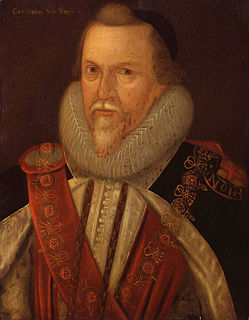
Thomas Cecil, 1st Earl of Exeter, KG, known as Lord Burghley from 1598 to 1605, was an English politician, courtier and soldier.

Henry Howard, 1st Earl of Northampton KG was an important English aristocrat and courtier. He was suspect as a crypto-Catholic throughout his life, and went through periods of royal disfavour, in which his reputation suffered greatly. He was distinguished for learning, artistic culture and his public charities. He built Northumberland House in London and superintended the construction of the fine house of Audley End. He founded and planned several hospitals. Francis Bacon included three of his sayings in his Apophthegms, and chose him as "the learnedest councillor in the kingdom to present to the king his Advancement of Learning." After his death, it was discovered that he had been involved in the murder of Sir Thomas Overbury.
Vice-Admiral Sir Henry Dudley (1517–1568) was an English Admiral, soldier, diplomat, and conspirator of the Tudor period.
William Hunnis was an English Protestant poet, dramatist, and composer.
Lord William Howard was an English nobleman and antiquary, sometimes known as "Belted or Bauld (bold) Will".
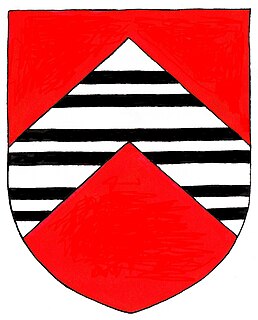
Sir Francis Throckmorton was a conspirator against Queen Elizabeth I of England in the Throckmorton Plot.

Sir Nicholas Throckmorton was an English diplomat and politician, who was an ambassador to France and later Scotland, and played a key role in the relationship between Elizabeth I of England and Mary, Queen of Scots.

Sir William Drury was an English statesman and soldier.
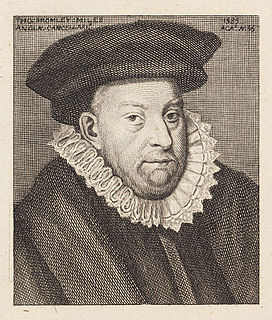
Sir Thomas Bromley was a 16th-century lawyer, judge and politician who established himself in the mid-Tudor period and rose to prominence during the reign of Elizabeth I. He was successively Solicitor General and Lord Chancellor of England. He presided over the trial of Mary, Queen of Scots and died three months after her execution.
Sir William FitzWilliam (1526–1599) was an English Lord Justice of Ireland and afterwards Lord Deputy of Ireland. In 1587, as Governor of Fotheringhay Castle, he supervised the execution of the death sentence on Mary, Queen of Scots. He was the Member of Parliament for Peterborough and represented County Carlow in the Irish House of Commons. He lived at Gainspark, Essex, and Milton Hall.

Sir Richard Cecil was an English nobleman, politician, courtier, and Master of Burghley (Burleigh) in the parish of Stamford Baron, Northamptonshire. His father Sir David Cecil, of Welsh ancestry, rose in favour under King Henry VIII of England, becoming High Sheriff of Northamptonshire in 1532 and 1533, and died in 1541.
Thomas Randolph (1523–1590) was an English ambassador serving Elizabeth I of England. Most of his professional life he spent in Scotland at the courts of Mary, Queen of Scots, and her son James VI. While in Scotland, he was embroiled in marriage projects and several upheavals. In 1568-1569 he was sent on a special embassy to Russia, visiting the court of Ivan the Terrible.
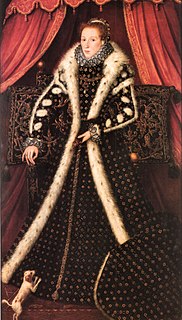
Frances Radclyffe, Countess of Sussex (1531–1589) was a Lady of the Bedchamber to Queen Elizabeth I and the founder of Sidney Sussex College, Cambridge. She was the daughter of Sir William Sidney, of Penshurst Place in Kent, a prominent courtier during the reign of King Henry VIII, and his wife, the former Anne Packenham. She was the sister of Sir Henry Sidney, and the aunt of both the poet Sir Philip Sidney and the first Sidney Earl of Leicester.
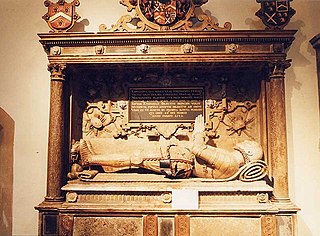
Sir Edward Horsey was a conspirator against Queen Mary, then a soldier, ambassador and courtier under Queen Elizabeth.
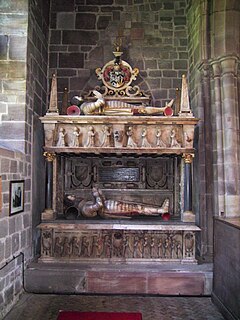
Sir Edward Littleton was a Staffordshire landowner, politician and rebel from the extended Littleton/Lyttelton family. A supporter of Robert Devereux, 2nd Earl of Essex, he was the victim of a notorious electoral fraud in 1597 and a participant in the Essex Rebellion, although he escaped with his life. In the reign of James I he was elected a member of the parliament of England.